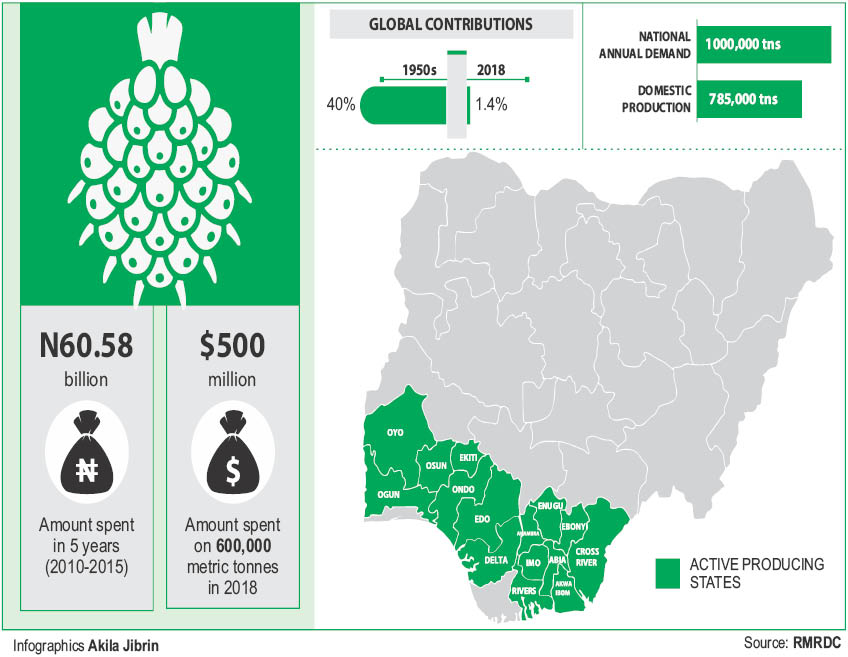How Nigeria blew billions on importation of palm oil
…we must strengthen our local production-FG Nigeria spent not less than N60.58 billion on the importation of oil palm and its derivatives between 2010 and 2015, a document obtained from the Raw Material Research Development Council has shown. According to the document, in 2018 about $500 million was spent on the importation of 600,000 tonnes […]

…we must strengthen our local production-FG
Nigeria spent not less than N60.58 billion on the importation of oil palm and its derivatives between 2010 and 2015, a document obtained from the Raw Material Research Development Council has shown.
According to the document, in 2018 about $500 million was spent on the importation of 600,000 tonnes of palm oil.
“Presently, the national annual demand for palm oil is in excess of one million tonnes, while domestic production is about 785,000 tonnes. As a result of the deficit, Nigeria spent approximately N60.58 billion on the importation of palm oil and its derivatives from 2010 to 2015. In 2018, about $500 million was spent on the importation 600,000 tonnes of palm oil,” the document read in part.
Experts in the sector believe that the oil palm sector has the not been contributing to Nigeria’s Gross Domestic Products (GDP) as we have in the past.
For years, especially in the 1950’s, Nigeria held centre stage as one of the largest producers and exporters of palm oil, accounting for more than 40% of global output, the Director- General of the Raw Material Research Development Council, Professor Hussaini Ibrahim Doko said.
He added, “As at then, oil palm production and export historically contributed substantially to Nigeria’s external reserves and agricultural GDP as palm oil and palm kernels exports composed 15.0 to 20.0% of the country’s total exports.
“However, the crude oil boom of the mid-seventies and the subsequent decline of farming were disastrous for the sector. By the end of the twentieth century, the Nigerian palm oil harvest had dwindled to just 7% of global production.
“With this downturn, the country’s contribution to global market share is now a meagre 1.4% as at 2018 as Nigeria’s oil palm is no longer competitive in global market despite its expansive cultivations in more than 24 states of the federation which includes Ogun, Ondo, Oyo, Edo, Osun, Cross River, Anambra, Enugu, Imo, Abia, Ebonyi, Ekiti, Akwa-Ibom, Delta and Rivers as leading producers. The global sales of palm oil exports totaled $30.4 billion in 2018,” he said.
Why Indonesia, Malaysia, others overtook Nigeria in oil palm production
Mr. Matthew Isieyomi, an agric expert and palm fruit farmer in Edo State agrees that the major problem hindering the competitiveness of palm oil is that most of them come from small farms and wild groves just as the processors also use manual techniques.
“Several million small-holders accounted for 80% of total production. They are spread over an estimated area of 1.65 million to 3 million hectares mostly in the wild. The estimate for oil palm plantations in Nigeria ranges from 169,000 hectares to 360,000 hectares of plantations,’’ said.
The RMRDC’s document also shows that vast oil palm estates (plantation) with acreage of 500 – 10,000 makes up only 5% of the entire palm oil production in Nigeria while the Malaysian oil palm industry has experienced extraordinary growth since the first commercial planting in 1917 and 1918.
“Since then, oil palm has been transformed into a formidable oil crop unrivalled by any of its competitors. Indeed, oil palm has proven to be one of the greatest success stories of the Malaysian economy. Area under oil palm cultivation expanded to 54 700 ha in 1960 to 5.39 million ha in 2014.
“Today, the sector is one of the most crucial foreign exchange earners for Malaysia. The success can be traced to favourable governmental policies and private sector initiatives. With increased supply of palm oil, supporting facilities such as refineries and oleochemical plants were established in tandem,’’ the document added.
How we are strengthening our local production-FG
The Raw Materials Research and Development Council collaborated with NIFOR to produce 5000 seedling of improved tenera variety that was distributed to farmers in the South East, South West and South South parts of the country for plantation establishment.
Also in 2017, the Council also distributed 10,000 seedlings of improved tenera seedlings to farmers associations and cooperative societies in the country under its strategic project on the development of vegetable oils in Nigeria. Apart from Cooperative societies, some other major beneficiaries are AICO Projects Ltd, Oba in Anambra State and Tokunbo Kayode Coperative Farm Ltd., Akoka, Ondo State .
The Council promoted the establishment of oil palm processing plants for cooperative societies in Anambra State. The cooperative societies include: Integrated Multipurpose Cooperative, Nnewi; Nnayekwu Palm Oil Cooperative, Oba; Ezeakonobi Multipurpose Cooperative Society, Ukpor. To promote production of Special Palm Oil by these cooperative societies, the Council provided and installed steam boilers, palm fruit digester, oil press, palm kernel cracker and Separator in the facilities of these cooperative societies.
According to the RMRDC DG, the major area of focus is to promote the establishment of oleochemical producing plants in Nigeria. Presently more than N20 billion is being expended on the importation of various types of oleochemicals into the country, it was gathered.
‘’We have consulted with other stakeholders and plans are on the way to develop equipment for production of different types of oleochemicals for investment promotion locally,’’ he said.
